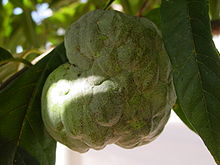Annonaceae
Annonaceae (custard-apple, or annona family) is the largest family of the magnolia order. It has 129 genera and 2,400 species. [1]
| Annonaceae | |
|---|---|

| |
| Annona squamosa fruit | |
| Scientific classification | |
| Kingdom: | |
| (unranked): | |
| (unranked): | |
| Order: | |
| Family: | Annonaceae |
Many species are valuable for their large pulpy fruits. Some are useful for their timber, while others are prized as ornamentals. The family consists of trees, shrubs, and woody climbers found mainly in the tropics, with a few species in temperate regions.
Their fruits defend themselves against some herbivores. Eating the neotropical plant Annona muricata (soursop, graviola, guanabana) is a causal agent in "atypical Parkinsonism". The causative agent, annonacin, is present in the seeds and leaves of many of the Annonaceae, though not in any significant quantity in the fruit flesh. It is thought to be responsible for up to 70% of Parkinsonian conditions in Guadeloupe. Exposure is typically through traditional food and natural medicines.[2][3][4][5] It is hard to interpret this. Presumably some favoured herbivores can eat it without ill effects. In some plants, seeds contain irritants to encourage early defecation.
Sources
change- Integrated Taxonomic Information System. Annonaceae
- University of Hawaii, Botany Department. Annonaceae
References
change- ↑ "Flowering Plant Families, UH Botany". www.botany.hawaii.edu. Retrieved 2020-08-14.
- ↑ Lannuzel, A; et al. (2003-10-06). "The mitochondrial complex i inhibitor annonacin is toxic to mesencephalic dopaminergic neurons by impairment of energy metabolism". Neuroscience. 121 (2). International Brain Research Organization: 287–296. doi:10.1016/S0306-4522(03)00441-X. PMID 14521988. S2CID 37873631.
- ↑ Champy, Pierre; et al. (2005-08-02). "Quantification of acetogenins in Annona muricata linked to atypical parkinsonism in Guadeloupe". Movement Disorders. 20 (12): 1629–1633. doi:10.1002/mds.20632. PMID 16078200. S2CID 31508365.
- ↑ Lannuzel A, Höglinger GU, Champy P, Michel PP, Hirsch EC, Ruberg M (2006). "Is atypical parkinsonism in the Caribbean caused by the consumption of Annonacae?". J Neural Transm Suppl. Journal of Neural Transmission. Supplementa. 70 (70): 153–157. doi:10.1007/978-3-211-45295-0_24. ISBN 978-3-211-28927-3. PMID 17017523.
- ↑ Caparros-Lefebvre D, Elbaz A (1999-07-24). "Possible relation of atypical parkinsonism in the French West Indies with consumption of tropical plants: a case-control study". The Lancet. 354 (9175): 281–6. doi:10.1016/S0140-6736(98)10166-6. PMID 10440304. S2CID 24204451.